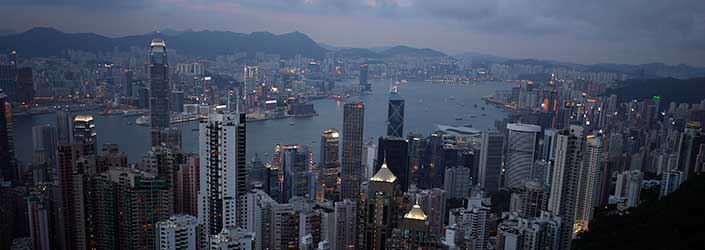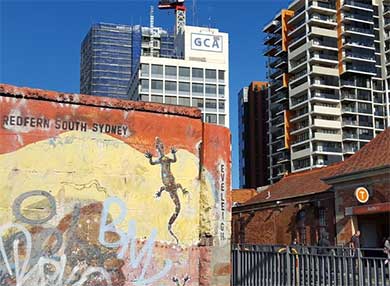Contact us
- 25 Wally’s Walk
- Macquarie University NSW 2109
- T: +61 (2) 9850 8077
- E: anthropology@mq.edu.au
Learn more about the research we undertake
See our researchSee what’s new in the School of Social Sciences
Read our newsSupporting the development & application of skills
About our research labs
Research on the social, political, economic, cultural and environmental processes shaping cities is paramount to respond to dynamic urban challenges emerging around the world.
Andrew Burridge (convenor), Sara Fuller, Donna Houston, Justine Lloyd, Peter Rogers, Kristian Ruming , Miriam Williams.
The Urban Worlds group addresses conceptual and policy challenges related to the way our cities are planned, governed and experienced.

Our approach is based on a transformative politics and dedication to improving urban futures through enabling justice and care in the city. Urban Worlds research draws together critical urban theory and planning practice to investigate the ways cities are managed and experienced by urban stakeholders, including policy makers, private sector actors, communities and a diverse array of non-human actors.
Central to our research is a multi-scalar lens which sees cities in relation to local, national and global practices and processes. We are dedicated to improving the policy and practices of urban governance through applied, comparative and collaborative research with governments, non-government organisations and communities which address real world urban issues.
Vertical Villages Community, Place and Urban Density Pilot Project: MQ EPS Grant (2019-2022) explores people’s experiences of living in multicultural high-rise, mix-tenure and high-density urban environments and the role Faith-Based Organisations can play in fostering community development through urban design and place-making. The project is funded through a grant between Baptist Care, Faith Housing Alliance and Macquarie University and involves Miriam Williams, Emma Mitchell, Kate Cavanaugh, Kristian Ruming and Amanda Wise.
The power of public spaces to connect communities and places: ARC Linkage (2022-2024). Donna Houston; Kate Lloyd; Miriam Williams; Justine Lloyd; Caroline Butler-Bowdon; Dillon Kombumerri; Vanessa Gordon; Fiona Morrison with NSW DPE and Transport for NSW. The project aims to uncover the vital role of public spaces during COVID-19 and in a time of climate change. The project adopts a collaborative framework to build dialogue, bridge academic and industry practice and promote debate about how to sustain public spaces now and in the future. Expected outcomes include new understandings of the diversity of community connections to public space and the importance of Indigenous leadership in public space-making and design.
Urban climate responsibility in the Asia-Pacific: MQRSG project (2019-2022). Sara Fuller, Daphne Mah (Hong Kong Baptist University) and Melissa Low (National University of Singapore). This project aims to provide a theoretical and empirically based analysis of the dynamics, discourses and practice of urban climate responsibility in the Asia Pacific region. It will provide a comprehensive analysis about the geographies of responsibility across the Asia Pacific region and improve understandings about the role of cities in developing equitable responses to climate change.
Valuing Creative Placemaking: UrbanGrowth/Landcom Communities of Practice project (2017-2021)’s co-authored book Michael Cohen (City People), Thayaparan Gajendran (University of Newcastle), Justine Lloyd, Kim Maund (University of Newcastle), Cathy Smith (UNSW Sydney), Josephine Vaughan (University of Newcastle). The project conducted a systematic literature review to support a methodology and toolkit to assist public and private sector stakeholders to gauge the value of creative placemaking in urban contexts. The overarching focus was on creative placemaking: both physical and tangible interventions, as well as more intangible creative processes undertaken during community-focused urban revitalisation activities, and as distinct from other forms of placemaking.
Were we all in this together? Sub-national border closures during Covid-19 and the shifting scales of governance and resilience MQRAS (2022); Dr Andrew Burridge; Justine Lloyd; Richie Howitt; Daniel Ghezelbash. This project examines how sub-national Covid-19 border closures have affected governance and resilience of border communities in NSW. Border closures and changing governance of services, communication of rules, and management of mobility have shifted Australians’ awareness and understanding of taken-for-granted internal borders. Regulation of sub-national borders has transcended pandemic management with legal, sociological and political implications, contrasting the national rhetoric of communities ‘being in the pandemic together’. This benchmark study, of national relevance, will develop relationships with key stakeholders and institutions, to establish a framework for understanding the role and function of sub-national borders in creating and dividing communities.
Universities as entrepreneurial urban actors: ARC Future Fellowship (2022-2024). Kristian Ruming received this Future Fellowship to critically analyse the role of universities in shaping Australian cities. By mobilising a detailed case study approach, the project expects to generate new theoretical and applied knowledge about how universities influence the planning, built form and social and economic functioning of our cities. and active sexuality.
Bulkeley, H., Edwards, G.A.S. and Fuller, S. (2014) Contesting climate justice in the city: Examining politics and practice in urban climate change experiments Global Environmental Change. 25, 31-40.
Burridge, A., Gill, N., Kocher, A., and Martin, L. (2017) Polymorphic borders. Territory, Politics, Governance, 5(3), 239-251.
Fuller, S. (2020) Towards a politics of urban climate responsibility: insights from Hong Kong and Singapore, Urban Studies. 57 (7), 1469-148.
Gill N, Conlon D, Moran D, Burridge A. (2018) Carceral circuitry: New directions in carceral geography. Progress in Human Geography. 42(2), 183-204.
Houston D, Hillier J, MacCallum D, Steele W, Byrne J. (2018) Make kin, not cities! Multispecies entanglements and ‘becoming-world’ in planning theory. Planning Theory 17(2), 190-212.
Power, Emma, and Miriam Williams (2019) Cities of care: a platform for urban geographical care research." Geography Compass 14 (1):1-11.
Rogers, P. (2020) The evolution of resilience. Connections 19 (3), 13-32.
Vaughan, J., Maund, K., Gajendran, T., Lloyd, J., Smith, C. & Cohen, M., (2021) Determining and representing value in creative placemaking. Journal of Place Management 14 (4), 430-445.
Williams, Miriam. (2017) Care-full Justice in the City. Antipode 49 (3), 821-39.